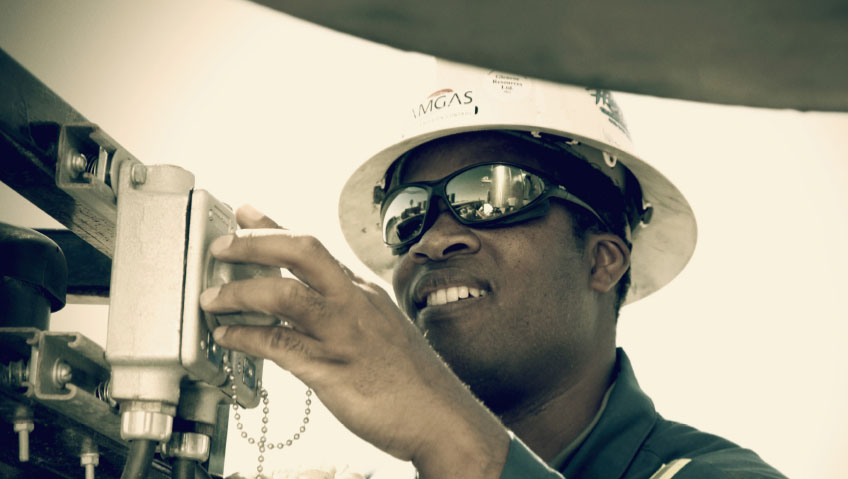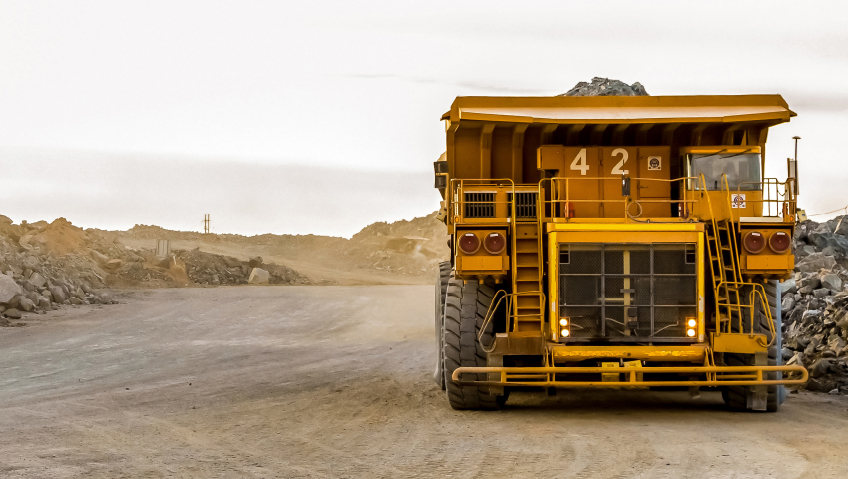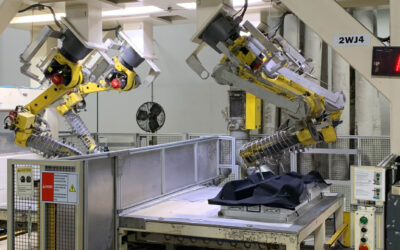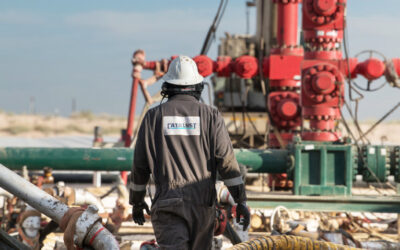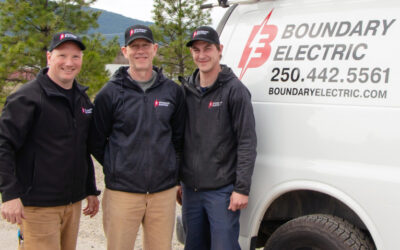Based in Calgary, Alberta, AMGAS Services Inc. is a world leader in emission control products and technologies for the oil and gas industry. The company’s proprietary solutions can be used against a witch’s brew of toxic emissions including hydrogen sulfide (H2S), toluene, xylenes, and benzenes. AMGAS has a global presence, big growth goals, and an eco-friendly attitude.
“We’re a bit of a three-headed monster because we build a lot of our own equipment, we manufacture our own chemistries, and then we perform our own services. We also do a tremendous amount of our engineering and R&D (research and development),” says Vice President Steve Martinson.
AMGAS offers services in the areas of well activity, shutdowns and turnarounds, sulphur services, transportation and terminals, production and processing, and tank gauging. Well activity includes testing, fluid treatment, completions, and underbalanced drilling while shutdowns and turnarounds cover vacuum truck venting, nitrogen purge scrubbing, and fan assisted tank venting. Production and production cover tank venting and fluid treatment while sulphur services entail re-melt and molten sulphur operations. Transportation and terminals cover truck loading, tank venting and pipeline services while tank gauging incorporates sweet pulley and sour service pulley operations.
While the company sometimes works with contractors, the team self-performs most services, and prides itself on its ability to offer proprietary solutions. “We’ve strategically looked at partnerships, but the vast majority [of the time] we sell, brand, and use our own technologies,” Martinson explains.
Sectors served by the company include oil and gas, pulp and paper, and agriculture. Oil and gas industries generate the lion’s share of assignments.
AMGAS has branches across Western Canada, as well as Midland, Texas; Williston, North Dakota, and Sarnia, Ontario. The firm also boasts an increasing presence in Abu Dhabi the capital of the oil-rich United Arab Emirates (UAE). “We carry out a lot of operations there and throughout Europe as well,” he states.
Ammonia was the main fluid used to treat hydrogen sulfide in the company’s early days. “We put the first patent on an H2S scrubber in 1989,” reports Martinson, adding that it does a “fantastic job protecting workers.” The process was how the firm acquired the name AMGAS. It decided to retain the original company name although it has not used ammonia in any of its processes for over a decade.
Other things have changed too, such as the scope of the firm’s operations. While the company is still proud of early products such as the H₂S scrubber, it has broadened its horizons over the years.
“For the first twenty-five years of the company, we were very focused on the safety aspect of H2S, but as we expanded, especially into different markets in the Middle East and West Texas, [we looked more closely at] the economics of removing H2S, doing it more efficiently. When I talk about ‘efficiency,’ I mean minimizing chemical use. Minimizing the impact on the environment really has become our focus and that’s where we’re guiding our R&D and our development efforts,” states Martinson.
This ‘green’ focus led to the introduction of the company’s cutting-edge CLEAR technology. This proprietary solution offers a chemical-free way of removing toxic hydrogen sulfide from sour crude oil, water, and condensate. This process is also called gas sweetening. “To sweeten gas is to take the H2S out of it,” he explains.
Martinson says CLEAR technology is “very exciting because it works on both crude oil and water. The basis of CLEAR tech is that we are eliminating the requirement for chemical injection into fluids. We are mechanically separating H2S from fluids, treating it externally. It really shrinks the chemical footprint for the client… and eliminates a lot of headaches further down the line for our producer partners.”
CLEAR technology enhances worker safety while minimizing costs and environmental harms for companies doing completions, well testing, and underbalanced drilling, among other duties. Martinson does not think it is at all unusual for a company that works in the oil patch to have such an environmental consciousness.
AMGAS wants to protect the environment because “a), we believe it’s the right thing to do, and b), I believe the oil and gas and energy industry wants to keep improving,” he says. The fossil fuel “energy industry will never be looked at as the greenest option but we’re showing people we are working toward efficiency and environmental awareness.”
Other company products and solutions include truck mount scrubbers, AMGAS capture technology, T-Series scrubbers and high gas rate scrubbers.
With a leadership team has been in place for nearly two decades now, the company’s culture reflects a strong sense of family. “We try to look at ourselves as a family company beyond the family. In the ownership group, one of my greatest sources of pride is that we have several longstanding team members who have been with us and grown with the company for years. I feel we’ve done a tremendous job of keeping good people engaged and on the team,” says Martinson.
“We’re a mid-sized company. I wouldn’t say we’re small—we’re definitely not a mom and pop operation. However, we don’t have thousands of people. We have around one hundred at our peaks,” he adds. “It’s exciting for people because we’re always pushing to bring on new technology, new ideas. I believe that keeps a lot of people excited. We continue to push. In the last two years, we’ve seen huge developments throughout the southern United States and Middle East.”
The company has worked on a slew of projects. “We have a substantial project in the oil sands, involving the removal of large amounts of H2S to keep them within their safety and venting requirements.”
In south-eastern New Mexico, AMGAS “has a large operation treating substantial amounts of sour gas,” while in Abu Dhabi, “We have been an instrumental [partner] as they transition to unconventional oil and gas production. We’ve been a large part of controlling emissions and treating sour fluids there,” Martinson continues.
He mentions one final project, in Sarnia, Ontario. Work there does not centre on hydrogen sulfide but on “benzenes and hydrocarbons… We’ve been focusing on large-scale emission control of noxious emissions.”
The advent of COVID last year had a mixed impact on AMGAS. The firm already operated in somewhat of a decentralized manner, with teams of field staff trained to work independently and utilize technology to communicate and follow procedures. Technology-based health and safety protocols were already in place when COVID hit.
The virus also served as something of a spur, forcing the company to refocus its promotional efforts. Given that in-person trade shows and industry events were closed for the most part, AMGAS decided to enhance its online presence and create more content that engaged followers.
One thing that COVID did not affect was its commitment to charity. “We’re huge supporters of the PSAC (Petroleum Services Association of Canada) STARS & SPURS Gala Campaign. That is something we hold near and dear,” says Martinson.
PSAC describes itself as the “national trade association representing the service, supply and manufacturing sectors within the upstream petroleum industry.” The STARS & SPURS Gala Campaign is an annual event to raise money for the Shock Trauma Air Rescue Society (STARS), which trains medical staff in rural locales and transports patients to hospitals. Due to COVID, the June 2021 Gala featured an online fundraising auction.
In addition to its own rapidly expanding network, AMGAS owns a pair of Alberta-based firms: Impact Industrial, a manufacturing business in Sherwood Park, and Roundline Transport of Red Deer. Both companies primarily serve the oil sands and were acquired roughly six years ago.
“Impact Industrial gives us the opportunity to fabricate large process equipment. They also provide auxiliary fabrication services to their own clients and shared clients [with us]. Roundline Transport allows us to be larger in transport. They service both their own clients and shared clients,” Martinson explains.
AMGAS has broad ambitions that it aims to achieve within five years. “We will have a very large presence in the Permian and the Delaware Basins in West Texas and Southeast New Mexico. We will expand further offerings throughout the U.S. We will continue to innovate in Canada and expand our processing elements, and we will be known as one of the leaders on the [environmental, social, and governance] side of the industry,” he states.

